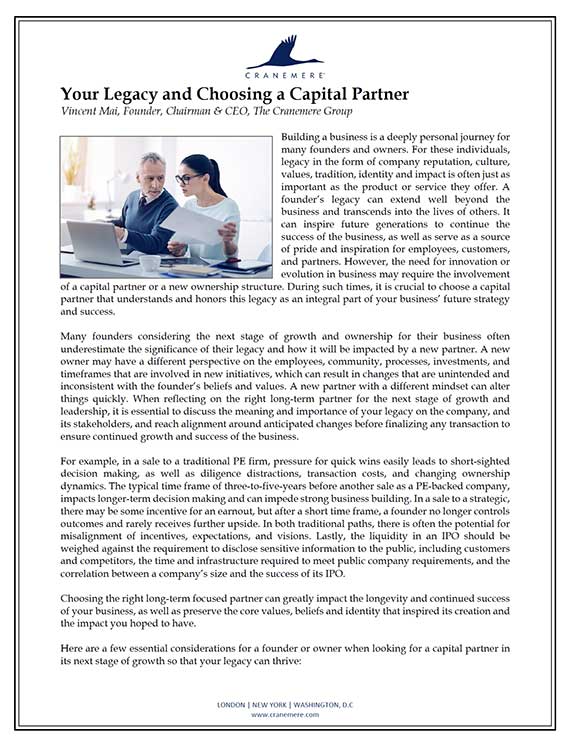
Download a White Paper from Cranemere Chairman, CEO, and Founder, Vincent Mai. (Click button at left)
Building a business is a deeply personal journey for many founders and owners. For these individuals, legacy in the form of company reputation, culture, values, tradition, identity and impact is often just as important as the product or service they offer. A founder’s legacy can extend well beyond the business and transcends into the lives of others. It can inspire future generations to continue the success of the business, as well as serve as a source of pride and inspiration for employees, customers, and partners. However, the need for innovation or evolution in business may require the involvement of a capital partner or a new ownership structure. During such times, it is crucial to choose a capital partner that understands and honors this legacy as an integral part of your business’ future strategy and success.
Many founders considering the next stage of growth and ownership for their business often underestimate the significance of their legacy and how it will be impacted by a new partner. A new owner may have a different perspective on the employees, community, processes, investments, and timeframes that are involved in new initiatives, which can result in changes that are unintended and inconsistent with the founder’s beliefs and values. A new partner with a different mindset can alter things quickly. When reflecting on the right long-term partner for the next stage of growth and leadership, it is essential to discuss the meaning and importance of your legacy on the company, and its stakeholders, and reach alignment around anticipated changes before finalizing any transaction to ensure continued growth and success of the business.
For example, in a sale to a traditional PE firm, pressure for quick wins easily leads to short-sighted decision making, as well as diligence distractions, transaction costs, and changing ownership dynamics. The typical time frame of three-to-five-years before another sale as a PE-backed company, impacts longer-term decision making and can impede strong business building. In a sale to a strategic, there may be some incentive for an earnout, but after a short time frame, a founder no longer controls outcomes and rarely receives further upside. In both traditional paths, there is often the potential for misalignment of incentives, expectations, and visions. Lastly, the liquidity in an IPO should be weighed against the requirement to disclose sensitive information to the public, including customers and competitors, the time and infrastructure required to meet public company requirements, and the correlation between a company’s size and the success of its IPO.
Choosing the right long-term focused partner can greatly impact the longevity and continued success of your business, as well as preserve the core values, beliefs and identity that inspired its creation and the impact you hoped to have.
Here are a few essential considerations for a founder or owner when looking for a capital partner in its next stage of growth so that your legacy can thrive:
- Define Your Legacy: Define what legacy means to you and what aspects of your business you want to protect and pass down. This can include your values, reputation, business culture, customer and employee relations, community or ESG impact and profit sharing. Defining what is essential to you can help guide conversation about preserving your legacy as your business grows and evolves.
- Understand Your Role: Consider your future role in the business and make sure your capital partner shares your vision. A business is personal for many founders, and it is a part of their legacy and community leadership. Discuss your role in the ongoing success of the business and ensure that you and your partner have a shared understanding of what that partnership means. In addition, a key part of any succession strategy is hiring people whom you respect and regard as equals and ‘co-leaders’. In choosing a capital partner, make sure you are aligned in terms of the people added to the team who will become future leaders and culture bearers.
- Consider Implications of Change: Growth requires change, and it is crucial to find a partner who understands the tension between maintaining the core elements of your business, your DNA, and pushing in new directions to innovate, stay relevant and grow. Choose a partner who can see beyond trends and understand the long-term opportunities for your business.
- Discuss Capital for Investment: Growth requires capital and capital needs will change over time. Consider your partner’s ability to provide sufficient capital and support investment in technology, customer acquisition, geographic expansion, and potential acquisitions. Align with your partner on the speed and urgency of these changes to ensure that they are consistent with your values and vision.
- Address Culture and Team: Strong cultures and capable teams make great companies. The people who help get you from the start to later stages in many cases are not just business colleagues, but trusted and respected personal, professional and community relationships, and in some cases close family members. You want a partner who is well-aligned with your values and sensibilities regarding decisions on people and culture.
- Evaluate Reward Systems: As you achieve financial liquidity for your hard work, you may want to reward and motivate those who’ve been on the journey with you. If you want to continue to build, understand the incentives and upside potential for you and your team. The best capital partners will want a strong leadership team to be motivated and well compensated to continue to build a great business.
As you consider your next steps, explore all options, talk to others who’ve been through the process and remember to consider what happens after you embark on your next stage of growth. Make sure you give strong consideration to how you will feel when there is another owner, another voice in shaping the company you’ve worked so hard to build and the legacy you hope will continue into the future. A well-aligned long-term focused partner will help ensure the success and longevity of your business for generations to come.

“Having run a major PE firm for 20 years, what concerned me most was having to sell our very best companies, rather than continuing to invest in and grow them. I started Cranemere as an alternative partner to ‘short-termism’ so prevalent in financial markets today.”
Vincent Mai, Founder, Chairman & CEO, The Cranemere Group.
